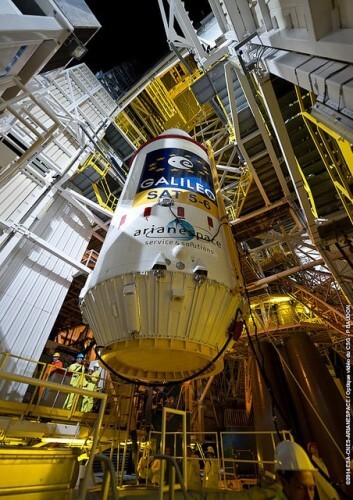Both events took place on Friday, August 22nd

The European Space Agency announces that an Ariane Soyuz launch vehicle launched from French Guiana on August 22, injected satellites from the Galileo series (the European GPS competitor) into the wrong orbit. The cost of building and launching Galileo satellites amounts to over a billion dollars per satellite.
Teams from the industry and space agencies involved in the launch are investigating the potential consequences of the malfunction on the mission. Both satellites are under the control and navigation control of ESOC - the control center of the European Space Agency in Darmstadt, Germany.
The two satellites, "Dorsa" and "Milna", were supposed to increase the number of satellites in the Galileo series from 4 to 6, out of 26 that the European Union plans to launch by 2017, and 30 in the longer term (the addition of satellites will be for backup purposes).
The European Union expects that by 2017, 26 satellites will be placed in orbit as part of the Galileo program, in which billions of euros are invested. Dorsa and Milena were supposed to be the number 5 and 6 satellites placed in space as part of the project. Brussels believes that the Galileo program will bring significant economic benefits to the EU countries once it is completed, which justifies the heavy financial costs for now.
https://www.youtube.com/watch?v=sdT6tdLP12c
In Texas, on the same day (August 22), a prototype of a Falcon 9 rocket exploded - a launcher that should be used a large number of times. The explosion was intentional after a malfunction in the launcher was discovered.
The Falcon 9 Reusable (F9R) rocket, the successor to the vertical takeoff and landing grasshopper rocket, has completed the latest in a series of ambitious tests of the innovative steering fins developed for it.
"Today's experiment was particularly complex, and pushed the limits of the tool's capabilities more than in previous experiments," SpaceX said in a statement issued following the incident. "As a regular procedure, the company will conduct a test of the flight data to analyze the tool's performance before the next test," said the company's statement.
SpaceX founder Elon Musk wrote on his Twitter account: The F9R, a missile with three subs destroyed itself during a test flight, there were no casualties, not even close. Missiles are a deceptive (technology).”
For news about the explosion of the SpaceX launcher on the Universe Today website

5 תגובות
The Galileo satellite costs 55 million euros and not as written...
This spectacular explosion is, in my opinion, worth every penny invested in the project 🙂
Money does not solve all problems
Why did everyone suddenly start "injecting" satellites?
Someone there must have misaligned the GPS... Miracles, was that you? 🙂 (Just kidding with you, don't take it to heart).